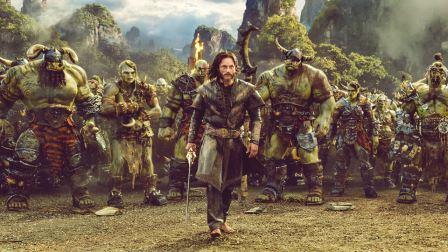Director Duncan Jones Wants To Break Hollywood’s Abysmal Video Game Adaptation Streak
The amount of experience you have on paper doesn’t always equate to what opportunities may drop in your lap. Prime example: Colin Trevorrow had just a short, a doc, a TV movie, and an indie on his resume before helming the $1.6 billion blockbuster Jurassic World.
And now Duncan Jones has found himself in a similar situation with Warcraft.
With just the indie darling Moon and sci-fi thriller Source Code under his belt, Jones was tapped to direct and cowrite what could easily become a multimillion dollar franchise. However, unlike Trevorrow, whose film tagged along on the tail of a trilogy that had already grossed more than $2 billion worldwide, Jones is entering an arena thick with the bad juju of Hollywood’s dismal attempts of adapting video games into films.
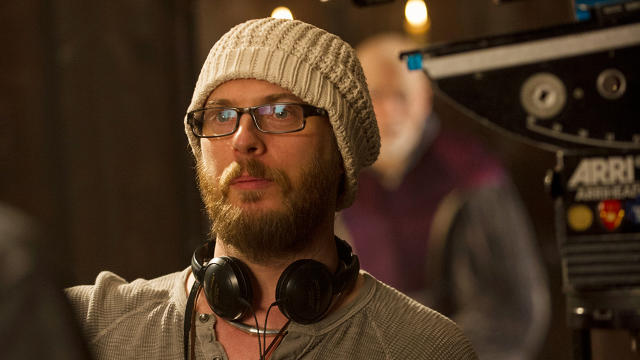
“I’ve been very strategic in how I’ve approached the jobs I want to do. Even before Moon, I did a short film called Whistle, and it had a lot of the things that I thought I would need to be able to do on a feature film: I shot on location, there was special FX work, there was stunt work, we used squibs, I shot on 35 mm film. I thought if I’ve done all this stuff it’ll make it easier for someone to trust me to do a low-budget feature,” Duncan says. “[At] each stage, I’ve been trying to build on it to get the opportunity to do whatever I want to do in the future as far as features go. And I looked at Chris Nolan’s career and the fact that he had gone from Memento, a small, little indie film, to Insomnia, kind of dipping his toe in the studio system, and then doing Batman. I always thought that was really smart the way he approached it, so I mirrored that as much as I could.”
Duncan is fusing his proverbial vision board of Nolan’s career with his personal love of gaming and its culture to hopefully undo the damage of Hollywood’s past when it comes to video game adaptations. Games like Max Payne or Prince of Persia may have loyal followings in gaming circles but translating them to the big screen—Max Payne (2008) and Prince of Persia: The Sands of Time (2010), respectively—is usually an automatic failure.
“Because I am a gamer, I think I’m very sensitive to what feels like it’s too obvious of gaming mechanics trying to be brought to the film. In the past, a lot of films based on video games think that the audience wants to experience what it’s like to play the game, and that’s absolutely not the case,” Duncan says. “[Gamers] want a film experience. They want to enjoy a story in a linear fashion where they’re being brought on a tour of a place they already know. I think trying to recreate the experience of a video game is where a lot of people fall into a trap.”
As a fan of Warcraft himself, Duncan is well aware of the monumental task in front of him: appeasing the franchise’s 5.5 million subscribers while giving people who’ve never played a second of Warcraft enough of a grounded narrative for them to establish a connection with the characters.
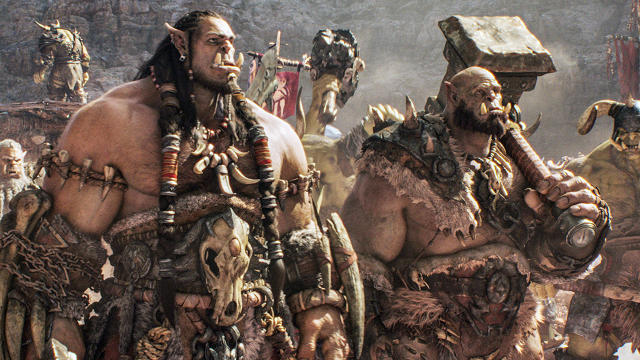
“We were standing on the shoulders of giants as far as fantasy films that have been done before—what Peter Jackson did with The Lord of the Rings trilogy really established the bar that we were trying to live up to,” Duncan says. “When the Fellowship of the Ring came out, there was an audience for that movie that hadn’t read [J.R.R.] Tolkien, [but] they felt invited into this fantasy world with these intriguing characters and this place that they had never been, but which felt so real and vibrant. We tried to really nail down what is the setting of this movie. What is it that makes our fantasy universe unique?”
Over the course of 22 years and 14 installments, Warcraft has become one of the most popular PC video games of all time. The MMORPG (massively multiplayer online role-playing game) spans across several planets and continents inhabited by the likes of elves, dwarves, humans, trolls, and orcs. The idea for a film adaptation had been floating around for close to 10 years, with director Sam Raimi attached to project in 2009. Due to scheduling conflicts, Raimi had to back out of the film, leaving the way for Jones.
“They’d been trying to make the movie for awhile, so they had already cut away a lot of the things that weren’t working before I became involved,” Duncan says. “And when I came in with my pitch, I think the reason I got the job [was that] I was kind of in sync with what they had already realized what they wanted the film to be, which was this origin story, in a sense.”
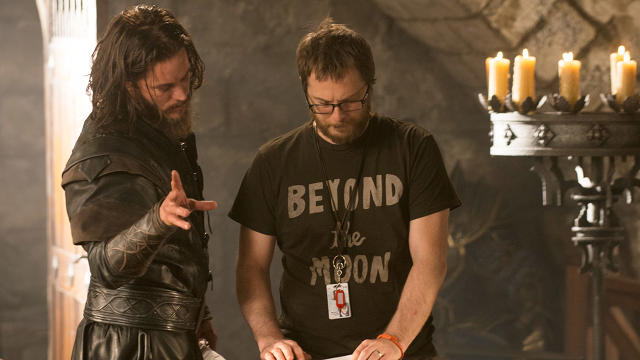
Duncan’s Warcraft focuses on the build-up toward the first major war between humans and orcs. The world of the orcs is on a rapid decline, so warlock Gul’dan (Daniel Wu) bands together an army of orcs to conquer the world of Azeroth, partially inhabited by humans. Although Gul’dan is trying to save his kind, the source of his powers is an all-consuming evil, which orc chieftain Durotan (Toby Kebbell) spots immediately as an imminent threat to everyone involved—humans included.
“My unique take on it was that I wanted to make a war movie where we spend as much time with each side so that the audience has a chance to empathize with the heroes of both sides of the conflict,” Duncan says. “Then it became about execution as far as how are we going to tell this story in a film format as a opposed to the more open-ended and broader storytelling that you have available to you when you’re doing a video game? How do we focus it and approach it as a movie?”
Part of focusing in was also pinpointing what Duncan felt was essential to the story, namely allowing the orcs to speak in their native tongue. When there are just orcs on the screen, the dialogue is in English, but there are moments with both orcs and humans that, in Duncan’s vision, needed to have that language barrier. One scene in particular was a meeting between the chieftain orc Durotan and the human king’s posse, mediated by the bilingual half-orc Garona. As the camera cuts back and forth between the two groups, English is translated into orc and vice-versa seamlessly without the use of subtitles.
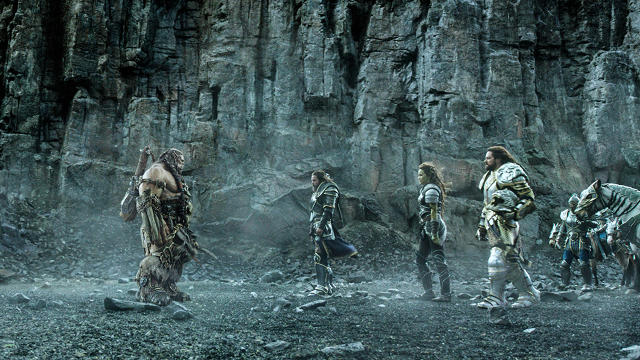
“[It was] the hardest scene. It wasn’t so much that I didn’t know how to do it, it was requiring this weird amount of faith from the producers that it would work,” Duncan says. “I knew it would work, but the producers were really concerned that the audience would be confused that suddenly now Durotan was speaking in English. That was one of those weird ones where I really had to beat the drum for this mechanic and convince them I was right. Fortunately, we shot it the way I wanted to shoot it and it worked. It was one of those weird situations where something I knew would work required them to see it in order to get it.”
It goes back to what Duncan has in his head as a worthy film adaptation of a video game. He wants a film that will, of course, be commercially successful but also one that will straddle the line of staying faithful to what fans love about the games and not necessarily regurgitating the game itself. To do that requires standing terra firma on ideas you know to be true.
“Film directing is really undermined if you attempt to do it by committee because there has to be a single vision as to how to tell a story. It’s like if you were at a campfire and everyone is taking turns to give one sentence in telling a horror story. It would be a mess—it’s not going to make sense,” Duncan says. “You have to have one person tell the horror story, otherwise you don’t know how to structure it. You don’t know how to build up to the big reveal. I think as a director, especially a writer/director, you have to fight for what you think is right to the end.”
Fast Company , Read Full Story
(52)

